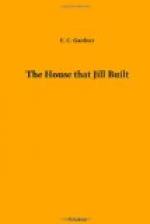“Dirt is matter out of place,” quoted Uncle Harry, in one of his erratic epistles which Jack and Jill always read with interest if not profit. “When you find anything that seems unclean or offensive in any part of your house, remember this: the fault is not in the thing itself, but in your ignorant or thoughtless management. There isn’t a material thing in the universe, whatever its name or characteristic qualities maybe; not a flaunting weed nor an unseen miasmatic vapor, which is not created for some good and wise purpose. It is for us to learn those purposes. The grand secret of safe and comfortable living lies in keeping yourself and everything about you in the right place. I hear much of the dangers and annoyances that arise from modern plumbing. I am not surprised by them; on the contrary, I wonder they are not more numerous and fatal, since nothing is more inconsistent with the first principles of comfort and health than our relations to these ‘modern conveniences.’ Instead of disposing of what are incorrectly called waste materials according to nature’s modes, we persist in defying her examples and her laws, even after we fully understand them, and, in the vain hope of adding to our own case, bring upon ourselves untold calamities. ‘Earth to earth’ is a mandate that cannot be disregarded with impunity. The infinite laboratories of nature welcome to their crucibles all the strange and awful elements which we fail to comprehend and against which we wage a futile warfare. If all these miscalled ‘wastes’ that we find so hurtful and offensive when out of place in and around our homes could be consigned to the bosom of mother earth the moment they seem to us worthless, they would be at once changed to life-giving forces, out of which forms of freshness and beauty would arise to fill us with delight. They are willing to serve us whenever we give them an opportunity. The one direct and infallible mode of doing that is to put them in the ground before they have a chance to work us injury. If we bury them, or, rather, plant them, they will bring forth, some thirty, some sixty, some an hundredfold.
[Illustration: NO PLACE FOR SECRET FOES.]
“It is my impression that sewers were originally invented by the Evil one. He couldn’t drag men down to his dominions fast enough, so he moved a portion of his estate to this planet, and lest its true character should be discovered, buried it under paved streets and flowery parks. We might easily and quietly put these crude materials into convenient receptacles, to be carried where they will bless the world by making two ears of corn grow where one grew before. This we could do, each one for ourselves, or more advantageously by cooperating with one another. We are too wasteful, too indolent, too ignorant. Tempted by the invisible sewers we imprison these misplaced and inharmonious elements for a time in lead or iron pipes, while they grow more hostile, occasionally escaping by violence or stealth into our chambers,




